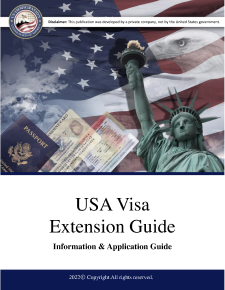
- Start Application Immediately
- Easy to Understand Instructions
- Apply Online or by Mail
- Pricing and Fee Information Included
- Checklist of Required Documents
- Unlimited Online Support
USA Visa Extension Guide
The U.S. Department of State issues nonimmigrant visas to foreign nationals who plan to stay in theUnited States temporarily. Different nonimmigrant categories haveanother period.Foreign nationals used to be provided with a paper form I-94, Arrival,and Departure Record,upon theiradmission to the United States. It showed the date ofentry, the class ofaccess,and the admitted-untildate.U.S. Customs and Border Protection have automated the Form I-94 arrival/departure record. It canbe used at sea and air ports of entry.The electronic system will generate ... anelectronicarrival/departure record with all data elements fromthe paper form. An I-94 paper form will not be issued. Instead, you will begivena CBP admission stampwith your travel document.An I-94 paper copy willstill beavailable at land-border ports of entry.Your nonimmigrant statusand the legal length of your stay in the United States areshown on your I-94/I-94W or travel document. Theadmissionsstamp on your travel document, or the I-94/I-94W, showshow long you can legally remain in the United States. However, your nonimmigrant visa (if issued) doesnot. Based on the visa classification, a visa does not show when or how often you can apply foradmission to the United States.Weknow you might want to stay longer in the United States thanplanned. This guide explains how toextend your stay in America to continue the same activities you enjoyed when you were admitted.
Read More